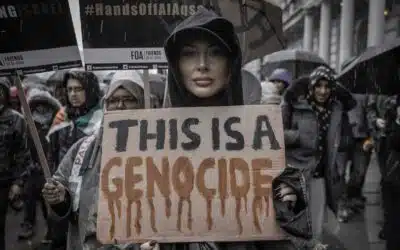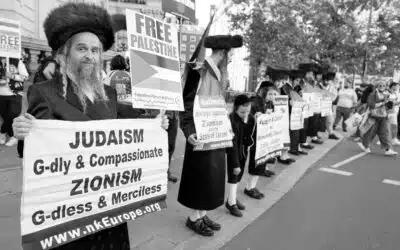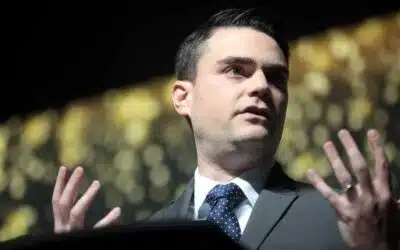The drums of war have again been beating at an ever-increasing tempo. In the crosshairs are Iran and Syria. Syria has been taking the heat since the murder of Lebanese Prime Minister Rafik Hariri. The U.S. was quick to point the finger at Syria, and a recent UN report on its investigation into the incident has been used as a reason to bang the drums louder.
After the report was released, Assistant Secretary of State C. David Welch said the report contained “amazing evidence” against Syria, and Secretary of State Condoleezza Rice said Syria must be held accountable for the murder.[1]
Last week, President George W. Bush called Iran and Syria “outlaw regimes” and used similar language as he had used with Iraq prior to the U.S. invasion, repeating that “The United States makes no distinction between those who commit acts of terror and those who support and harbor them because they are equally guilty of murder.”[2]
The news coverage has been accommodative of the government’s intentions towards Syria. The report “established a clear link between Syrian officials and their Lebanese allies in Hariri’s murder”, according to the Associated Press, and “linked the brother-in-law of Syria’s president to the Feb. 14 car bomb that killed Hariri and 20 others, and said Lebanese intelligence officials helped organize it. The report stopped short of fingering Syrian President Bashar Assad or his inner circle. But it accused the regime of failing to cooperate in the inquiry. The report also alleged Syrian Foreign Minister Farouk al-Sharaa lied in a letter to the investigating commission.”[3]
An editorial yesterday in The New York Times said, “Last month’s report by a United Nations investigating committee makes it clear that all the available evidence points toward high-level Syrian involvement in the Hariri murder and that Syrian officials, while pretending to cooperate, have been deliberately misleading the investigators.” It called for “concerted international pressure” on Syria “backed, if necessary, by sanctions against the Syrian regime itself” in order to “force Mr. Assad to stop obstructing the investigation.”[4]
Syria rejected the report, saying it was based on witnesses “who are well known for their anti-Syria stands”, and that it lacked any real evidence but was based on “gossip”.[5] A foreign ministry adviser told reporters that the report’s conclusions were “without any foundation”, but that “Syria remains committed to the decisions of international legality, and we will continue to co-operate with the international community.”[6]
Meanwhile, the General Command of the Popular Front for the Liberation of Palestine issued a statement saying it was surprised to have been cited by the U.N. report. “There is no evidence whatsoever on the PFLP-GC’s involvement,” the statement said, “and no contacts were made by the international investigation commission with any member of our group. All that was said in the report about the PFLP-GC is totally untrue.”[7]
The Islamic group al-Ahbash also issued a statement in response to the report’s claim that one of its members made several phone calls the day of the assassination and several days after with Lebanese security officials, and also a call to Lebanese President Emile Lahoud minutes before Hariri was killed by a bomb blast. The statement said that “the group has no link whatsoever with this act and is keen more than ever to uncover the real truth.”[8]
The credibility of one key witness cited in the report has been called into question. Der Spiegel reported:
The alleged intelligence agent al-Sadik, 42, on whose testimony a considerable portion of the investigation is based, has been convicted of embezzlement and fraud, among other crimes. Even within the UN Commission investigation … there is doubt of the credibility of the Syrian witness. Sources within UN circles say that Sadik had undeniably lied. At first he had claimed to have left Beirut in the month prior to the deed. Then, at the end of September he admitted to having been involved in the implementation of the assassination. Apparently Sadik had received money from a third party for his testimony. According to a statement by his brother, Sadik had called him from Paris in late summer and said “I’ve become a millionaire!”[9]
The report concludes by saying that “all people, including those charged with serious crimes, should be considered innocent until proven guilty following a fair trial.”[10] In contrast to this, the Bush administration seems to have already made up its mind, and the media appear only too willing to parrot their view.
So what does the report actually say? It states that “there is converging evidence pointing at both Lebanese and Syrian involvement in this terrorist act.” It also says that “the Commission received extensive support from the Government of Lebanon” and that “The Lebanese authorities have steadily shown the capacity to take increasing responsibility in pursuing the case. This was demonstrated by the fact that they took the initiative of arresting suspects, organizing raids and searches.”
There seems to be a contradiction in suggesting Lebanese involvement while also praising Lebanese investigative efforts and cooperation with the UN. The explanation, of course, it is recognized that there is a distinction between the government of Lebanon and individuals within that government who may have had a hand in the assassination. The report seems to suggest that rogue elements within Lebanese intelligence service were somehow involved.
It is also interesting to note that the U.S. government has not called for sanctions or threatened war against Lebanon for its alleged involvement, even though, in fact, the report makes clear that the evidence indicates that elements within the Lebanese intelligence service were the principle players.
Syria is connected to the crime circumstantially, as the report notes: “Given the infiltration of Lebanese institutions and society by the Syrian and Lebanese intelligence services working in tandem, it would be difficult to envisage a scenario whereby such a complex assassination plot could have been carried out without their knowledge.” This assumption is, of course, based upon another assumption, that the Lebanese intelligence service was involved in the first place.
Other evidence indicating Syrian involvement is based upon testimony of individuals whose credibility is not known. No corroborating evidence apparently exists to support most such testimony.
Just what is the “amazing evidence” of Syrian involvement? Why are government officials and the media so reluctant to speak in specifics? Just what is the “clear link between Syrian officials and their Lebanese allies”? Just what is the evidence that “linked the brother-in-law of Syria’s president to the Feb. 14 car bomb that killed Hariri”? If “The report also alleged Syrian Foreign Minister Farouk al-Sharaa lied in a letter to the investigating commission”, just what did he lie about? What does the report really say about it?
If, as The New York Times tell us, “all the available evidence points toward high-level Syrian involvement in the Hariri murder”, what is this evidence? Why does The New York Times not substantiate this statement by quoting from the actual report? And just how has Syria been “obstructing the investigation”? Why is the nature of this “obstruction” not indulged upon their readers?
The most damning evidence mentioned in the report is the use of “six pre-paid calling cards, which telephone records demonstrate were instrumental in the planning of the assassination…. The phones were situated so that they covered every route linking the Parliament to Quorayitem Palace: that is, cellsite records demonstrate that these telephones were placed to cover any route that Hariri would have taken that day.” As the report concludes, “This is a line of investigation that needs to be pursued thoroughly.”
Government officials are right to say that those responsible for the act of terrorism that resulted in the murder of Rafik Hariri should be held accountable. But we should seek to ensure that we know for certain who was responsible before we start suggesting who to hold to account. Nor should we seek to punish the innocent along with the guilty. Even if high-level Syrian involvement is proven, the people of Syria must not be made to pay the price for the crimes of their leaders, as the people of Iraq have been made to paid the price for the crimes of Saddam, real or fabricated.
That is one lesson from the war in Iraq that we should not have failed to learn.
[1] “Syria Must Be Held Accountable for Hariri Killing, Rice Says”, Associated Press, October 21, 2005
[2] Caren Bohan, “Bush calls Iran and Syria ‘outlaw regimes’”, Reuters, October 28, 2005
[3] “Syria Must Be Held Accountable for Hariri Killing, Rice Says”, Associated Press, October 21, 2005
[4] “A Warning to Syria”, The New York Times, November 1, 2005
[5] “Syria ‘must be held to account over Hariri death’”, The Guardian, October 21, 2005
https://www.guardian.co.uk/syria/story/0,13031,1598038,00.html
[6] Inigo Gilmore, “Syria hits out against Hariri murder claims”, The Observer, October 23, 2005
https://www.guardian.co.uk/syria/story/0,13031,1598903,00.html
[7] “Denial by groups cited in U.N. report”, United Press International, October 21, 2005
[8] “Denial by groups cited in U.N. report”, United Press International, October 21, 2005
[9] “Pivotal Witness in Mehlis Report is a Convicted Swindler”, Der Spiegel, October 22, 2005
https://www.spiegel.de/politik/ausland/0,1518,381056,00.html
Translation at:
https://www.informationclearinghouse.info/article10726.htm
[10] Detlev Mehlis, “Report of the International Independent Investigation Commission Established Pursuant to Security Council Resolution 1595”, October 19, 2005


